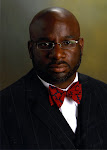

Above is a trap door used to hide escaping slaves. To the right is the pastor of Jacob's Chapel, the Rev. Terrell Person, my colleague on the Camden-Trenton District.
[This article is reprinted here from the Courier Post Newspaper, October 22, 2008, by Lavinia DeCastro, www.courierpostonline.com]
MOUNT LAUREL — Members of Jacob's Chapel African Methodist Episcopal Church in Mount Laurel celebrated their congregation's 195th birthday by remembering the past and preparing for the future.
During a ceremony last week, Jacob's Chapel launched the "Join The Journey Capital" campaign to raise $1 million over the next three years to preserve the church's two historic buildings (Jacob's Chapel and the Colemantown Meeting House) and Civil War cemetery. The money will also be used to buy land to erect a new building to house a growing membership.
"We want to bring these buildings back to the way it was in the past with the pot-bellied stove and stained glass window," Pastor Terrell W. Person said.
Housing one of the oldest African-American congregations in the state, the church was established in 1813. It was part of the Underground Railroad, which allowed escaped Southern slaves to reach the North.
A key player in the development of the Underground Railroad was Medford-born William Still, son of slaves Charity and Levin Still, who escaped long before the formal railroad route was devised.
Most of the Still family is buried at the church's cemetery, including Dr. James Still, the famous "Black Doctor of the Pines" and herbalist.
The congregation first met in the Colemantown Meeting House, believed to be among the oldest original black church buildings in the nation. Inside, hand-hewn beams outline the frame of the Quaker-built structure, which is still used for Sunday school.
In 1850, the congregation built a new church on land donated by a local Quaker, Albert Jacob. Jacob's Chapel is named after him.
"We have an opportunity to preserve this history right now and we must," said Department of Environmental Protection Deputy Commissioner John S. Watson Jr., the keynote speaker at the event. "Our duty as public servants is to preserve these places and to help people understand why they're important."
Watson vowed to help the church list its structures on the state and national Register of Historic Places and secure state funds for preservation.
"We stand with you in spirit and resources," Watson told the more than 100 people who attended Saturday's event.
In addition to restoring the congregation's historic structures and archives, Person said he wants to purchase five more acres of land to build a 300- to 400-seat sanctuary and community development center.
"The past is important, but we also have a community to take care of," said Person, a descendant of Dr. James Still.
The church already owns four acres across the street from the Elbo Lane chapel.
"The people who have gone before us, the Harriet Tubmans, the William Stills, the Quakers, they have laid down such a foundation for us," said Charles Buffington II, the lead consultant for the capital campaign. "We share their treasure, but it takes money for restoration, it takes money for development, it takes money to build a house of faith."
Helen Gaines, of Moorestown, has a great-uncle, Civil War veteran George Robinson, buried at the cemetery.
"I've been here ever since I was born," Gaines said. "I'm looking forward to restoring this church."
Reach Lavinia DeCastro at (856) 486-2652 or ldecastro@courierpostonline.com
[To contact the Jacob's Chapel to assist in their Capital Campaign, call 856-235-7900.]



